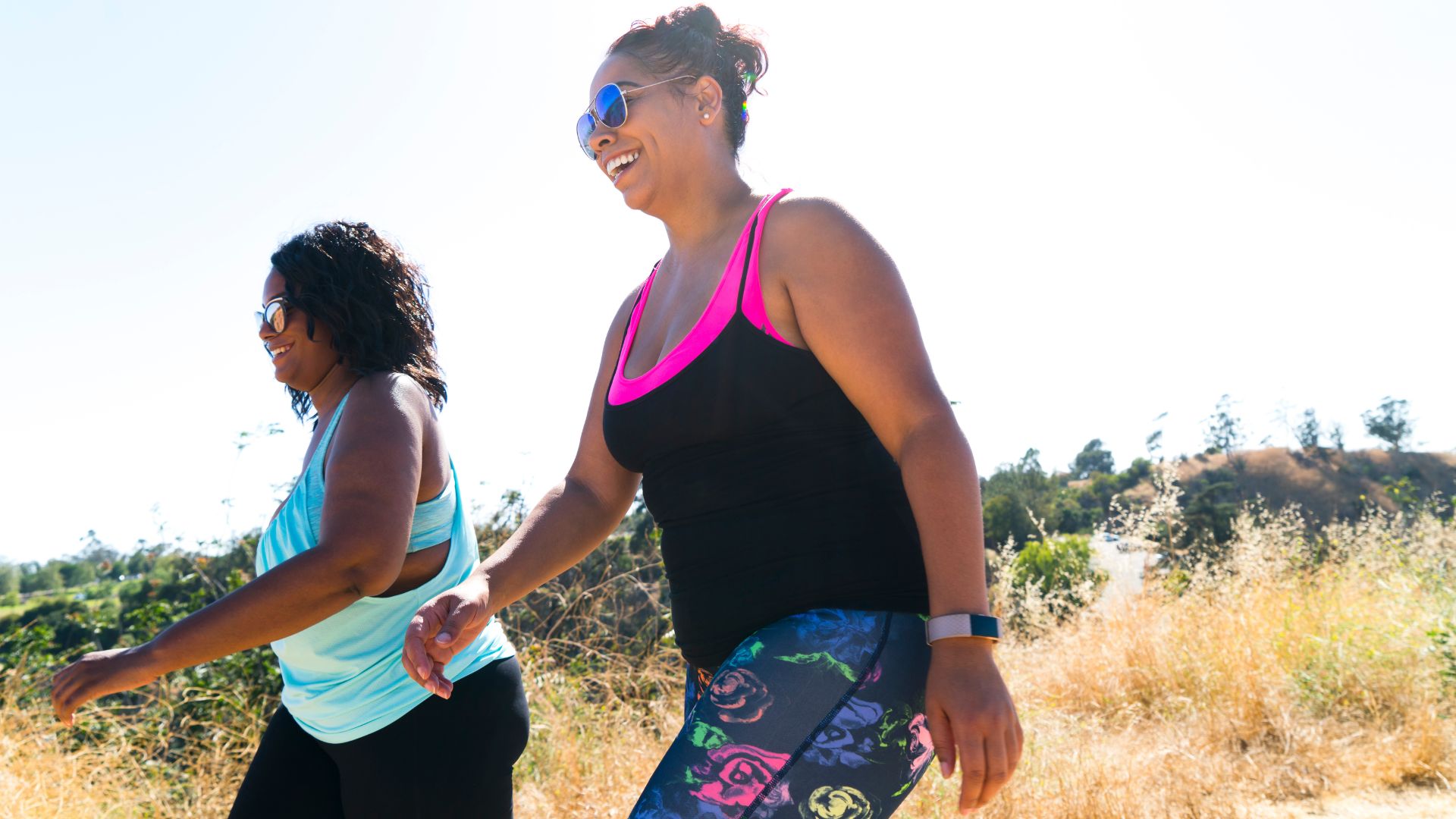Is walking good exercise? Plus, the health benefits of including more cardio in your routine
Is walking good exercise? Personal trainer reveals all you need to know about the benefits for your health


Is walking good exercise? While running, swimming, cycling, and other intense cardio activities are often promoted at the 'best' type of exercise no matter your personal fitness goals, evidence would suggest that's not quite the truth.
Walking has so many physical benefits, like helping us to maintain good heart health and sleep better, those who walk regularly already will know that taking a stroll can also help you get to sleep easier, maintain a healthy appetite, and improve your social life.
So there's no need to switch to running, cycling, or doing other activities you don't enjoy as much if you're already walking as a workout. Here, woman&home speaks to a certified personal trainer all about exactly why walking is a good exercise, how often you should do it, and all the benefits you can experience.
Is walking good exercise?
Yes, walking is a great exercise for anyone to do, regardless of fitness level or ability. As well as being a great cardio workout, walking builds muscle and can help to strengthen bones, lessening the risk of injury. However, it will be most effective for those who are older or looking to get fit more or less from scratch.
"These people will find their 'Zone 2' aerobic fitness will improve via walking," Arj Thiruchelvam, a performance and nutrition coach, explains. "This is because they'll be able to achieve 60 to 70% of their maximum heart rate just by walking, as opposed to needing to run or do some form of more intensive exercise."
This Zone 2 training zone may be described as up to 70% of your maximum heart rate but it's a 'talking pace' in practical terms, where you're on the move but still able to hold a conversation. "This zone improves aerobic endurance, increasing the number of capillaries that serve the muscle and thus the delivery of oxygen to that area of the body," explains Thiruchelvam, who is also the head coach and founder of Performance Physique.
If you're particularly fit or exercise regularly and wondering 'is walking good exercise for me?', the good news is that it can still contribute to a healthy lifestyle. "It will contribute to weight management and movement goals that improve your general mobility and stiffness," he adds.
Sign up for the woman&home newsletter
Sign up to our free daily email for the latest royal and entertainment news, interesting opinion, expert advice on styling and beauty trends, and no-nonsense guides to the health and wellness questions you want answered.

How much cardio should I do a week?
Current health guidelines from the NHS and the Department of Health in the US suggest that 150 to 300 minutes of cardio exercise per week, along with strength training exercises at least twice a week, is the best way forward for most people. This can be continuous moderate-intensity exercises, such as walking and light jogging, or vigorous-intensity exercises like running.
However, while there are so many benefits of cardio exercise, it's important to work out in a way that you enjoy. There's no point in aiming for 150 minutes of intense hiking if you don't enjoy it, as you're less likely to do it again in the future and 150 minutes is likely to switch to 0 minutes a week pretty quickly, even with the best intentions. Instead, opt for a cardio activity you do enjoy or try something new - such as wild swimming or bouldering - to discover what's out there.
Benefits of cardio exercise
1. Increase in heart size
As the name suggests, cardiovascular exercise works the cardiovascular system, which is controlled by the heart. And just like any other muscle, the heart increases in size when we exercise it well.
"An increase in heart size has additional benefits for both blood pressure and heart rate," explains the coach. "Both resting and submaximal heart rates are reduced, which means the body doesn’t have to work as hard to meet the demands of exercise."
This can be exercise we optionally take on in our 150 recommended minutes, or just moving through life. The larger our heart, the less work it has to do to keep us moving, he explains.
"Cardiac output, which is the amount of blood pumped by the heart, increases significantly during high-intensity exercise so the body can deliver more oxygen to the muscles and get rid of cardio dioxide quicker. What all this means is, adopting regular cardiovascular exercise improves how efficient the body is in transporting blood and oxygen around, which results in lower workloads and higher coping ability."
2. Reduce the risk of cardiovascular disease
"Although cardiovascular diseases have numerous variables, it's also clear that regular cardio exercise can decrease risk factors and improve our heart health," Thiruchelvam says.
Several studies, including an early study linked to the University of Washington and a recent one linked to the University of Southern Denmark, have confirmed this. In both cases, the researchers concluded that walking may significantly reduce the risk of cardiovascular disease hospitalization in both men and women. The optimum amount of walking, they also confirm, was around four hours a week or up to 10,000 steps.
Another wider review by the University of Limerick goes so far as to call walking "the first steps" in preventing cardiovascular disease, highlighting just how beneficial taking a turn around the block every day can be for our health.
3. Lowers blood sugar levels
A healthy blood sugar level, not too low and not too high, is associated with a lower risk of several adverse health conditions, including heart disease, vision loss, and kidney disease.
It's also important for our regular day-to-day functioning. If our blood sugar levels are too high, chances are we'll start to feel tired, nauseous, and dehydrated. And if they're too low, studies by Des Peres Hospital and Wesley Medical Center confirm, we're likely to also feel tired, hungry, irritable, and lethargic.
Walking can help to keep your blood sugar levels at a healthy baseline, confirms the nutrition coach. "It can improve the way our body handles blood sugar responses, known as insulin sensitivity," he explains. "This means the body has to produce less insulin to manage food being consumed."

4. Cardio exercise is proven to boost our mental health
When it comes to our mental health, any type of walking from walking meditation to mountain hiking works wonders. We're all familiar with the idea of a so-called 'runners high' but our own experience, and research from New York University, will tell us that we can achieve the same feeling with a brisk walk.
Walking triggers the release of serotonin and dopamine hormones in the body, the review shows, two hormones that work to improve our mood. Another study by Technische Universität München goes into more detail and explains that exercise can also increase our endorphin levels, chemicals released by the body under stress or pain that can lead to feelings of euphoria and happiness in the hours afterward.
It's clear that exercise improves our overall ‘fitness’ but the benefits of walking for our brains and mental health are often undervalued. There is an overarching statement that should motivate us all to exercise more, says Thiruchelvam. "A large volume of studies have identified that regular cardiovascular exercise three to five times per week can improve our quality of life, reduce the risk of hospitalization, and decrease the rate of long-term mortality."
5. It can help us sleep better
If you want to learn how to sleep better, heading outdoors for a bout of cardio exercise could be the way forward. The combination of increased tiredness and positive feelings associated with the surge in serotonin and dopamine naturally makes us feel ready for bed, but a study by Iran University of Medical Sciences highlights that sleep quality improves with all kinds of aerobic exercise too.
Further research from the Universidade Federal de São Paulo compared three groups of participants who suffered from insomnia, one doing moderate-intensity aerobic exercise, another doing high-intensity exercise, and another doing resistance training. Although plenty of other research points to the benefits of all kinds of exercise on sleep quality, only those doing moderate aerobic exercise experienced an improvement in sleep quality, duration, and incidences of sleep apnea in this study.
6. It can help with weight loss
Taking up some kind of walking for weight loss program is one of the most healthy ways to get into a routine if you're looking to lose weight and are new to working out. While many people think of running as the most effective method to burn calories, it's not sustainable or recommended for beginners to go from doing no running at all to running every day. However, it's entirely possible to walk every day.
Plus, walking is an underpinning component of non-exercise activity thermogenesis (NEAT). It sounds complicated but, really, this is just the way we calories we burn doing activities outside of exercise - such as walking the dog, moving around the house, and even sitting down and eating.
"A study by Duke Medical Center found that, in overweight individuals, seven to nine months of low-intensity exercise [roughly 11.8 miles per week] significantly increased cardiorespiratory fitness compared to sedentary individuals," says Thiruchelvam, who also relies on this method in his own 4 Weeks 4 Kilos weight loss program.
Including more NEAT in your daily routine won't fatigue your muscles or push you out of your comfort zone too much, but will help you get into an energy deficit.

Grace Walsh is woman&home's Health Channel Editor, working across the areas of fitness, nutrition, sleep, mental health, relationships, and sex. She is also a qualified fitness instructor. In 2025, she will be taking on her third marathon in Brighton, completing her first ultra marathon, and qualifying as a certified personal trainer and nutrition coach.
A digital journalist with over seven years experience as a writer and editor for UK publications, Grace has covered (almost) everything in the world of health and wellbeing with bylines in Cosmopolitan, Red, The i Paper, GoodtoKnow, and more.
-
 How to charm your in-laws: the ultimate guide to keeping the peace
How to charm your in-laws: the ultimate guide to keeping the peaceDiscover how to strengthen your in-law relationships, one thoughtful gesture at a time
By Natalie Denton Published
-
 Aldi's affordable bedding is actually made by my favourite sleep brand - it's got more than your duvet covered
Aldi's affordable bedding is actually made by my favourite sleep brand - it's got more than your duvet coveredAldi's Anti-Allergy Bedding has arrived in the middle aisle and it's more affordable than the best mattress toppers, duvets, and mattress protectors out there
By Laura Honey Published